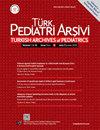Nedeni bilinmeyen ateşle başvuran opere doğuştan kalp hastalığı olan hastada Coxiella Burnetii endokarditi
IF 1.5
Q3 Medicine
引用次数: 1
Abstract
Q fever is a zoonotic infection caused by Coxiella Burnetii Although it is usually asymptomatic acute form of disease may change from flu like illness to severe pneumonia Chronic form may present with vascular disease or endocarditis A 6 year old female patient from Sudan followed with the diagnosis of pulmonary atresia and ventricular septal defect was referred to our department because of stenosis in the conduit placed to right ventricular outflow during Rastelli operation performed in Sudan Six months ago in Jordan stenting was performed for conduit stenosis but was unsuccessful Because of long lasting fever she was treated for culture negative endocarditis in Sudan In physical examination fever and hepatosplenomegaly were present Laboratory findings revealed anemia leukopenia Coombs rsquo; positivity hypergamaglobulinemia and positive anticardiolipin antibodies but blood cultures were negative Different antibiotic protocols were administered for culture negative endocarditis for 2 months but fever persisted On 67 day of hospitalization positive antibody titers for Coxiella Burnetii were detected and doxycycline and hydroxychloroquine were started Here a case of chronic Q fever due to Coxiella burnetii which is a rare cause of culture negative endocarditis is presented Turk Arch Ped 2013; 48: 339 41Q热是一种由伯纳氏克谢氏菌引起的人畜共患感染,虽然通常无症状,急性形式可由流感样疾病转变为严重的肺炎,慢性形式可表现为血管疾病或心内膜炎。一位苏丹6岁女患者在苏丹进行拉斯泰利手术时,因右心室流出管狭窄而被诊断为肺闭锁和室间隔缺损,转介至我科6个月前,她在约旦因导管狭窄接受了支架植入术,但没有成功。由于长期发烧,她在苏丹接受了培养阴性心内膜炎治疗。体检时,她出现发烧和肝脾肿大。对培养阴性心内膜炎2个月仍持续发热的患者,采用不同的抗生素治疗方案。住院67天,检测到伯纳氏杆菌抗体阳性,并开始使用强力霉素和羟氯喹。本文报告一例由伯纳氏杆菌引起的慢性Q热,这是一种罕见的引起培养阴性心内膜炎的原因Ped 2013;[04:39 . 39
本文章由计算机程序翻译,如有差异,请以英文原文为准。
求助全文
约1分钟内获得全文
求助全文
来源期刊

Turk Pediatri Arsivi-turkish Archives of Pediatrics
Medicine-Pediatrics, Perinatology and Child Health
CiteScore
1.00
自引率
0.00%
发文量
0
审稿时长
6-12 weeks
期刊介绍:
Turkish Archives of Pediatrics is the official publication organ of Turkish Pediatrics Association. The journal is an international scientific periodical which implements the independent, unbiased peer-review model, publishes content on pediatric health and diseases and its publication languages are both Turkish and English. Turkish Archives of Pediatrics is published four times a year on March, June, September and December and publishes a supplementary issue for Turkish Pediatrics Congress.
The journal’s target audience includes academicians, expert physicians, assistants and medical students. The journal aims to publish high quality research papers on basic and clinical sciences. Turkish Archives of Pediatrics also publishes editorial comments, letters to the editor, rare case reports and content which would contribute to the continuing medical education of physicians. Review articles can only be prepared by academicians upon an invitation.
 求助内容:
求助内容: 应助结果提醒方式:
应助结果提醒方式:


